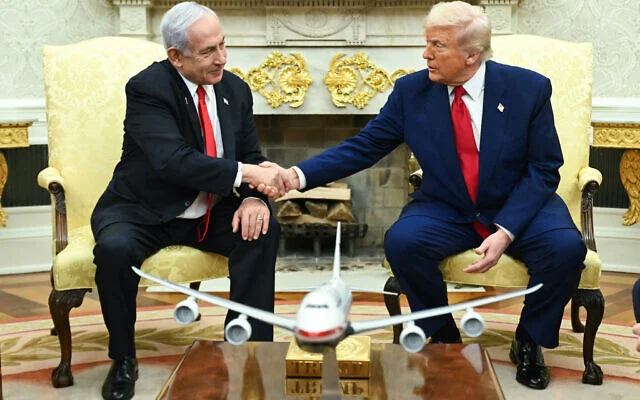US President Donald Trump hosted Israeli Prime Minister Benjamin Netanyahu at the White House on Monday, marking the first foreign leader visit since Trump’s sweeping global tariffs were announced on 2 April.
The leaders discussed Iran’s nuclear ambitions, ongoing efforts to secure the release of Israeli hostages held by Hamas, and Trump’s contentious proposal for the US to assume control of Gaza.
Trump reiterated his desire to end the 18-month war in Gaza.
I’d like to see the war stop, and I think the war will stop at some point, that won’t be in the too-distant future.
However, he offered no specific timeline or diplomatic pathway, instead doubling down on his plan to transform Gaza into a US-administered “Freedom Zone” while relocating Palestinians to unspecified countries. Netanyahu echoed Trump’s vision, framing it as offering Gazans “choice” and claiming unnamed nations were willing to accept refugees.
Trump’s proposal, first floated in February 2025, has drawn widespread condemnation. UN Secretary-General António Guterres and human rights organisations. They labelled it a blueprint for “ethnic cleansing”, evoking parallels to the 1948 Nakba, when 700,000 Palestinians were forcibly displaced.
The plan’s reliance on coercing neighbouring states like Jordan and Egypt–both of which have rejected it–has further strained regional relations.
Legal experts argue the proposal violates international law. The International Court of Justice (ICJ) ruled in 2024 that Israel’s seizure of Palestinian territories is unlawful, and transferring Gaza to US control would breach prohibitions on territorial conquest.
The meeting coincided with grim milestones: over 50,750 Palestinians killed in Gaza, including 50 in the past 24 hours, according to local health authorities. Netanyahu defended Israel’s blockade and renewed military campaign, which human rights groups say has created a “coercive environment” rendering Gaza uninhabitable, a factor critics argue underpins Trump’s relocation plan.
While Netanyahu claimed progress on a hostage deal, Trump admitted securing releases was “a long process”. The leaders’ rhetoric contrasted sharply with global appeals for aid access and ceasefire renewal. European leaders, meanwhile, have backed a $53 billion Egyptian-led reconstruction plan opposed by both the US and Israel, which prioritises Palestinian-led recovery over Trump’s “Riviera” vision.
As Trump prepares for Saturday’s Iran nuclear talks, the Gaza crisis remains a litmus test for his administration’s foreign policy.
